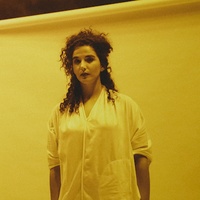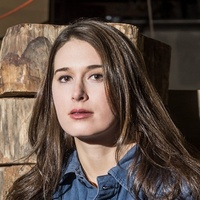As told to T. Cole Rachel, 1054 words.
Tags: Art, Beginnings, Inspiration, Process, Politics.
On becoming an artist
Nigerian artist Ken Nwadiogbu discusses leaving his career in engineering behind to become an artist, evolving his process over time, and why it's important for him to be political in his work.You went to school for Engineering and then ended up becoming an artist. What advice do you have for people who might be thinking of pursuing their art? Or for people who might be stuck in a career that maybe they aren’t passionate about?
The one thing I tell people is, do not be afraid to start! Fear is one of the biggest mountains restricting us from our success, and until we dare to climb that mountain and pass it, then we won’t find what we’re in search of, be it creativity or any other thing. I was able to conquer the fear of starting, then the fear that I might fail, then the fear of my parents who felt leaving engineering for art was a huge mistake, then the fear of society seeing me as someone who’s at the edge of failing in life, and then the fear of the art world looking at me as a very young, uneducated visual artist who cannot make it in this field. Take a leap of faith and conquer your fear.

In addition to showing your work in galleries, you started your own business doing commissions for different people. I’m curious about how your process changed during that time. Were you gradually making larger and larger pieces? Did your technique change?
Yes. I kept growing as an artist, from doing commissions to creating my personal pieces. Commission requests could vary in sizes and mediums, so it did give me the experience I needed on the presence and perception of large pieces and the massive narratives they possess. You see, you cannot unsee some art pieces, especially large beautiful pieces. That was my aim, to get my works starting a conversation, and the only way they could do that was for people to identify with them and be drawn in by them. So once I started doing my personal pieces, I just went large immediately, sticking to 3-D illusions in my works.

So much of your work deals with social issues—politics, race, feminism. Why is it important to you to be a political artist? And how do you think artists can influence culture?
I grew up in a country where all these were, and still are, issues. These issues become the foundation on what most families are built on, and because of it, there seems to be no change or development. I grew up in an environment that uplifts so many ill things, and if I am not mistaken about the goal of an artwork, then my goal was to use my art to speak about these things. My goal was to move completely away from trying to beautify a client’s place, to becoming a strong activist against the wrongs of my society and the world as a whole. I think art is not just a reflection of society and culture, but also a driving force against it. And one way that I know and have seen contemporary artists actually influencing culture with their art is through social media platforms, especially Instagram, which is arguably the largest gallery in the world.

What have been some of the most surprising reactions to your work? Is it received differently at home in Nigeria than in other parts of the world?
The idea that it is hyperrealism always amazes people. It’s always interesting to watch their faces when they react to the words “it’s done with only a pencil.” But that’s not all—the fact that other ideas and narratives are added to it now gives it more value. My works are perceived well both at home and abroad, though it is obvious that the Nigerian art scene is still growing, so there’s better or more appreciation for my pieces abroad.

What is your process like? Do you go into the studio and work every day? Do you have a certain routine for the way you like to work?
I graduated as a Civil Engineer last year and started to live alone this year. Before, it was all about trying to balance school work with art. I’d literally skip classes to work at my parent’s place over and over again. I’d work while I took my exams and work after I was done with the semester. But now, after graduation and being alone, I just sleep and work every day and every night without consideration of time. At times I get my ideas around 1am and just start a new piece right then, so all my art materials are always ready and on standby.
How has your work changed over the years?
Well, my narratives have grown stronger because I’m beginning to experience even more, and be aware of a lot of things in Nigeria and the world. For my 3-D technique, it’s been with me over the years, but it’s getting stronger and more realistic with every work of art.

What’s next for you? You’ve pioneered a certain way of working in your art—do you envision trying other things?
I’m working on installations, photography, and art videos… all to strengthen the narratives I’m eager to portray, and to give a diverse media of expression. At the moment, I’m working on a project called the 1005 Portraits. This is an installation project inspired by my quest and hunger for feminine empowerment. In this project exists 1005 portraits of different women of different races from different countries coming together against feminine denigration.
What advice do you have for young artists?
These five things have always worked for me (in no specific order): persistence, patience, perseverance, practice, and prayer. I live by these things and they’ve helped to structure and direct me down the right path. Follow these five truths and love the process.

Ken Nwadiogbu recommends:
-
Places: Art Basel Miami and Venice Biennale
-
Music: Composers like Hans Zimmer and Thomas Newman
-
Artist: Leonardo Da Vinci and Michelangelo





